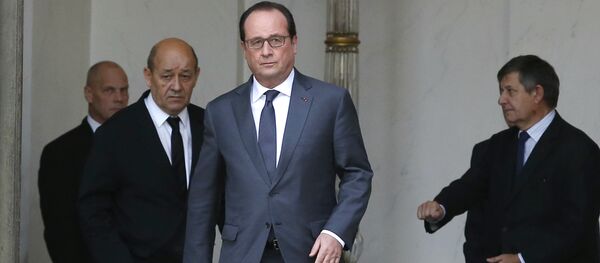In France, President Hollande is calling for the constitution to be amended to allow for increased security and surveillance to "eradicate" potential terrorists at home.
In a clarion call to arms in the French parliament, he declared: "France is at war!"
France 24 anchors: 'In that speech, Hollande seems to be preparing the country for a lengthy war against the Islamic State.'
— Christopher Miller (@ChristopherJM) November 18, 2015
Mr Hollande's words come as French police continue to raid sites across the country in an effort to head off further attacks.
In the early hours of this morning, officers were involved in a siege in northern Paris, in which one woman is reported to have blown herself up during the stand-off.
The speed of these raids is made possible, in part, by Hollande's decision to immediately declare a state of emergency in the country on Friday night.
This enables the French government to act in ways that would not normally be permitted. Individuals judged dangerous, may be placed under house arrest, whilst searches and seizures may be conducted at any time.
If prolonged beyond 12 days, it must be authorized by Parliament — and that, in essence, is what Monsieur Holland is pressing for.
He's asking French politicians to pass legislation that would give the government more flexibility to conduct police raids and place people under house arrest without needing a warrant. He is also considering broader surveillance powers.
France *already* had the state surveillance powers which the UK security lobby are now urging. The Paris atrocities still happened.
— David Allen Green (@DavidAllenGreen) November 16, 2015
Concurrently, in America, a Republican senator from Arkansas has submitted a bill, titled the Liberty Through Strength Act, which would extend the NSA's ability to collect Americans' phone metadata and store it for more than a year. Tom Cotton insisted that last week's terror attacks in Paris has shifted the debate on the balance between individual privacy and public security.
If we take anything from the Paris attacks, it should be that vigilance and safety go hand-in-hand," Cotton said in a statement.
"Now is not the time to sacrifice our national security for political talking points. We should allow the Intelligence Community to do their job and provide them with the tools they need to keep us safe."
Mr Cotton also wants Congress "to make permanent the USA Patriot Act's 'lone wolf' and roving wiretap provisions."
I’m introducing legislation to postpone the impending termination of an essential NSA counterterrorism program. https://t.co/KmI8UepByQ
— Tom Cotton (@SenTomCotton) November 17, 2015
The controversial Section 215 of the Patriot Act permitted the government to conduct roving wiretaps of suspects, who switch communication devices, as well as allowing spying on 'lone wolf' individuals — suspects who are not affiliated with an international terrorist organization. It was left to expire last summer after public resistance to the extent of American mass surveillance, revealed by former NSA contractor and whistleblower Edward Snowden in 2013.
However, after France's last mass terror attack in January, in which 11 people were killed when Islamists stormed the office of French satirical magazine Charlie Hebdo, France also introduced new security measures.
So, France had the surveillance powers (that the UK security services want) for 6 months, right? I mean… that helped?
— Lee Griffin (@Niaccurshi) November 15, 2015
Critics say they have yet to make a significant impact. They point to the fact the Paris terror suspects were able to plan and implement last week's attacks without being detected, which indicates that an immediate crackdown on privacy rights may not be the best solution.
Indeed, the French, American and British governments, who are all pushing for increased state powers, have yet to explain to the public, how they would specifically help prevent another coordinated mass-fatality attack.



